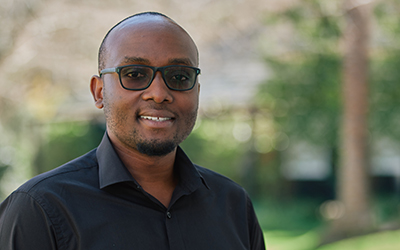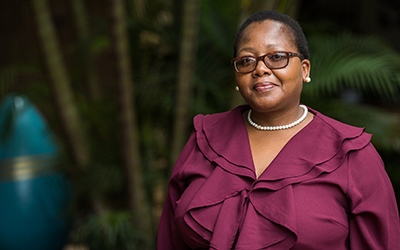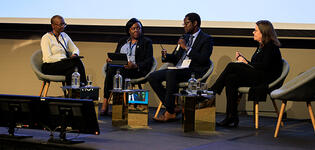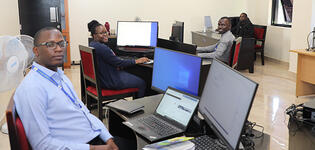Blog
From tax data to inclusive policies
How collaboration can help
UNU-WIDER has worked for several years in collaboration with sub-Saharan African revenue authorities to facilitate the analysis of digital tax data. During a visit to Kampala, Uganda this year, we asked our colleagues how this collaboration has been useful to them. How do they see their role going forward in supporting the achievement of sustainable development in their respective countries?
Collaboration simplifies work
 Ezekiel Swema is an Economist at the Tanzania Revenue Authority (TRA) and has recently worked on a study analysing potential value added tax revenue.
Ezekiel Swema is an Economist at the Tanzania Revenue Authority (TRA) and has recently worked on a study analysing potential value added tax revenue.
‘Working together can simplify our work. For instance, previously we used the top-down approach to estimate the VAT gap. Then we learned about the bottom-up approach. This approach points to those segments of taxpayers where the gap is likely to be the greatest, so allows us to also direct new enforcement mechanisms. So nowadays we are using micro level information to inform policymakers.’
‘As the global economy becomes more interconnected, tax authorities are more likely to work together to combat tax avoidance and evasion.’
Providing data access to researchers is important
 Mamiky Leolo serves as the Executive Manager of the Macro Economic Research Unit within the National Revenue and Compliance Management Division at the South African Revenue Service (SARS). She is involved in UNU-WIDER’s SA-TIED programme.
Mamiky Leolo serves as the Executive Manager of the Macro Economic Research Unit within the National Revenue and Compliance Management Division at the South African Revenue Service (SARS). She is involved in UNU-WIDER’s SA-TIED programme.
‘The establishment of the National Treasury Secure Data Facility was an important step to provide data access to researchers. Furthermore, the construction of a standardized personal income tax microsimulation model for analysing the efficiency of the PIT is a major achievement that is currently under construction. Personal income tax with a share close to 40% of total tax revenue is the major source of tax income in South Africa.’
‘The role of tax authorities will increase in importance due to the increasing need for sufficient stable tax revenue. Furthermore, the advancement in technology, the digital economy with digital currencies, the globalization of economic activities and mobility of human capital, are posing increasing demands on governments to protect their tax bases.’
Research needs to align with the changes in the economy
 Norbert Afya, a Business Intelligence Developer at the Uganda Revenue Authority (URA) has played an essential role in the creation of the URA tax data laboratory that was launched in 2022.
Norbert Afya, a Business Intelligence Developer at the Uganda Revenue Authority (URA) has played an essential role in the creation of the URA tax data laboratory that was launched in 2022.
‘Learning from others’ experiences will eventually save resources and time. We receive a lot of requests to share our digital data. These requests often need quick handling but with extra caution. Going forward, our secure research lab is going to be a central point for all data requests. The internal resources will no longer be scattered all over.’
‘The revenue authority has the power to direct the research to align with the changes in the economy, also regionally.’
Increase in tax collection thanks to research
 Gerald Agaba is a Research Lab Assistant at the Research laboratory of URA. He highlights the importance of networking and learning new skills.
Gerald Agaba is a Research Lab Assistant at the Research laboratory of URA. He highlights the importance of networking and learning new skills.
‘The biggest thing we have achieved through this collaboration is networking. We have a chance to meet professors and various groups of people in different revenue authorities. That is important for us.’
‘URA would not have had so much capacity development activities without this collaboration.’
Gerald provides an example of the role of research.
‘Research is key in the development of a country. For example, we had a problem with the tax filing website. It was too hard for people to navigate through. Now we are having a new revamp of the website, and it is being developed based on the user needs.’
‘Uganda is a country that is realizing the importance of research. Thanks to evidence-based research we have had an increase in revenue collection.’
Value for data is important
 Laban Simbeye is a Manager for Statistics and Data analytics at the Zambia Revenue Authority. He has already seen changes happening thanks to the research collaboration.
Laban Simbeye is a Manager for Statistics and Data analytics at the Zambia Revenue Authority. He has already seen changes happening thanks to the research collaboration.
‘After we got the results from the study assessing the impact of withholding value-added tax we decided to make a small administrative change, so that the big firms don’t need to withhold among one another. We observed that letting big firms withhold among themselves resulted in large liabilities at the same time as large credits on the same account.’
‘Tax administrations need to think more seriously about the data management process, because it is the value you get from the data that is important at the end of the day. Luckily at ZRA we got the data governance bluepritn approved by the board, including a budget, and that is enough for us to take off.’
‘Collaboration with UNU-WIDER has helped us to produce high quality research papers quicker than we would have done otherwise. This type of collaboration encourages co-ownership of the research process from start to finish. Our junior researchers get a chance to participate.’
‘In the future many tax authorities in Africa will begin to collect large volumes of data. When you have data, you can support analytics, you can even support artificial intelligence. Those administrations that will succeed at this will catch up with the rest of the world. And those that fail to do this will fall back for many years to come. That’s my prediction.’
For more information on revenue authority collaboration in sub-Saharan Africa check out this panel discussion of the WIDER Development Conference 2023 Revving up revenue for development – the role of domestic resource mobilization.
The views expressed in this piece are those of the author(s), and do not necessarily reflect the views of the Institute or the United Nations University, nor the programme/project donors.
 Join the network
Join the network











